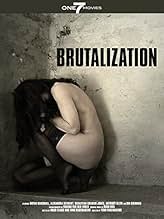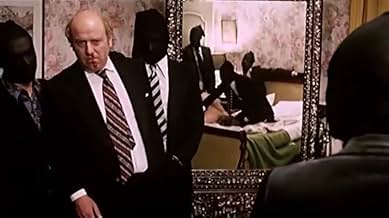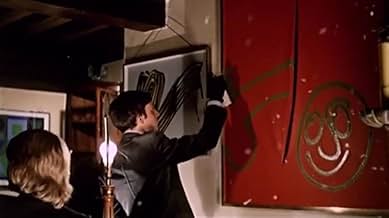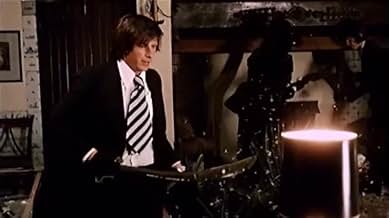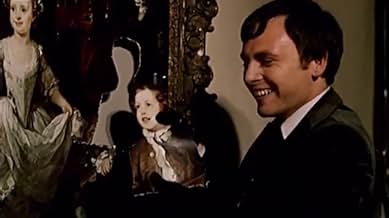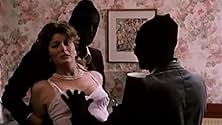अपनी भाषा में प्लॉट जोड़ेंA gang of wealthy ne'er do wells rape and terrorize women for fun and force their husbands to watch. A police detective tries to catch them, but can he break their twisted loyalty to one ano... सभी पढ़ेंA gang of wealthy ne'er do wells rape and terrorize women for fun and force their husbands to watch. A police detective tries to catch them, but can he break their twisted loyalty to one another?A gang of wealthy ne'er do wells rape and terrorize women for fun and force their husbands to watch. A police detective tries to catch them, but can he break their twisted loyalty to one another?
- निर्देशक
- लेखक
- स्टार
फ़ीचर्ड समीक्षाएं
It looks like "A Clockwork Orange"(1971) made in Bloemendaal, North Holland, two years later. Of course it's different and it's not even close to Kubrick's masterpiece, although the scene of collective rape is very well done. I wanted to see it due to the presence of the beautiful Alexandra Stewart. And, I had the surprise to see also Sylvia Kristel in one of her first roles.
In an opening scene redolent of Kubrick's A Clockwork Orange (1971), six masked youths vandalise the property of a wealthy married couple; when the owners arrive home to discover the hoodlums still at work, the husband is forced to watch as his wife is stripped and gang-raped. Uncompromising Amsterdam detective Van der Valk (Bryan Marshall) investigates the case, and comes to suspect a group of privileged teenagers called The Ravens, whose search for kicks has led them to be exploited by a Charles Manson-style svengali.
Because Of The Cats is a little sluggish at times, but its gritty realism will most likely keep fans of Euro-crime films and '70s exploitation more than happy. The initial sexual assault is graphically depicted in all of its ugliness, there's a smidgen of violence, and, with this being a Dutch film, we also get full frontal nudity from both sexes. Eagle-eyed viewers might even recognise Sylvia Kristel of Emmanuelle fame as one of the 'Cats', the elite girls who associate with The Ravens, and who provide the film with its most memorable scene, a spot of night-time skinny dipping that turns to murder.
6.5 out of 10, rounded up to 7 for IMDb.
Because Of The Cats is a little sluggish at times, but its gritty realism will most likely keep fans of Euro-crime films and '70s exploitation more than happy. The initial sexual assault is graphically depicted in all of its ugliness, there's a smidgen of violence, and, with this being a Dutch film, we also get full frontal nudity from both sexes. Eagle-eyed viewers might even recognise Sylvia Kristel of Emmanuelle fame as one of the 'Cats', the elite girls who associate with The Ravens, and who provide the film with its most memorable scene, a spot of night-time skinny dipping that turns to murder.
6.5 out of 10, rounded up to 7 for IMDb.
This film is now available in all its 98 minute glory on a Dutch (Region 2) DVD for a very reasonable price. The really good news is that the rape scene is nothing like as graphic or as protracted as other reviewers suggest. The five minutes are intercut with the police questioning of the victims. I'm at a loss to understand why four minutes were cut from the original British release as the rape scene itself lasts for no more than two minutes.
My title for this review has a question mark because it is very different from the treatment we have become used to in long-form dramas like "The Bridge". The film is very much of its time. It is certainly not as action-packed as modern American dramas which may be why some reviewers find it slow. I thought the portrayal of Van Der Valk was reasonably true to the novels save, of course, for the philandering with Feodora.
The film as a whole worked well aside from the hippy-trippy bit towards the end which really stamped it as being from the early 1970s, although I think that the basic plot idea or rich kids going bad is one of Freeling's less believable stories.
My title for this review has a question mark because it is very different from the treatment we have become used to in long-form dramas like "The Bridge". The film is very much of its time. It is certainly not as action-packed as modern American dramas which may be why some reviewers find it slow. I thought the portrayal of Van Der Valk was reasonably true to the novels save, of course, for the philandering with Feodora.
The film as a whole worked well aside from the hippy-trippy bit towards the end which really stamped it as being from the early 1970s, although I think that the basic plot idea or rich kids going bad is one of Freeling's less believable stories.
Get a bunch of hormonally-stoked, wealthy, presumably-untouchable teen boys together in an iron-clad clique and let the proverbial sex and mayhem fly. Released in 1973, around the time David Hemmings had his hands full with "Unman, Wittering, & Zigo," and James Mason was dealing with "Child's Play," this youth delinquency story centers around a group of six well-to-do, but never-do-well teens who perpetrate rape and extreme vandalism. Bryan Marshall is the put-upon detective in Amsterdam who is assigned the case after a particularly graphic gang rape takes place in his metropolitan jurisdiction. All leads point to a Dutch seaside town and the six lads, who are seen as upstanding youth in the community, as the perpetrators.
The intriguing element about this otherwise slow-moving affair is the realistic bent director Fons Rademakers brings to the proceedings. The gang rape which opens the film has an air of frank reality not seen in many films during the '70s. His technique doesn't excuse the horrifying nature of the moment by using quick-cut editing, or slashing guitars on the soundtrack, or wild lighting and intense close-ups, all of which would be the way most commercial-driven directors of today would handle this sickly scene. We are forced to watch, along with the victim's husband, as she is taken by five of the six members of the gang. The vision of her just watching her husband with disgust is a hard image to shake.
Rademakers introduces naturalistic elements like this throughout. An interrogation scene of the boys' girlfriends by Marshall (which includes the barely-on-screen presence of Sylvia Kristel) is handled with nuance usually reserved for Hollywood A-type dramas. The natural, everyday-life approach to dressing and undressing (Marshall is seen full frontal, as is his prostitute girlfriend, the entrancing Alexandra Stewart)is executed in a manner completely devoid of any awareness of the camera. A Harrison Ford or Ben Affleck will always take care to cover their privates in a "bedroom" scene with a sheet or a back turn just at the right moment, which immediately makes an audience remove themselves from the story, thinking, "oh, that's right, he's a star; he doesn't want his ding-a-ling to show." Here, it's not cinema verite, but it is just natural.
Even though Marshall's not shy about revealing his shortcomings, it can also be noted he isn't shy about showing much range in his acting abilities. Both he and the criminal lads display a woefully limited amount of acting chops. On the other hand, the women in this film emote a more believable and compelling performance.
Unfortunately, the music score is oftentimes obnoxiously introduced. It sounds like the same cue is dropped in at varying points of transition without any thought of its dramatic effect or variance in rhythm or pitch on the scenes. It's quite distracting from any drama being built up on the screen by Rademakers.
Overall, the mystery of the story, which centers around a cult-like devotion amongst the boys, doesn't lend any surprises nor any suspense-filled moments. It's fairly threadbare. But the naturalness of certain scenes mentioned before, make it a step above the usual Euro-low-budget fare of the '70s. It's a naturalness like fellow Dutchman Verhoven exhibited in "Turkish Delight" and "Keetje Tippel", but without his over-the-top shock values. My rating ** out of ****.
The intriguing element about this otherwise slow-moving affair is the realistic bent director Fons Rademakers brings to the proceedings. The gang rape which opens the film has an air of frank reality not seen in many films during the '70s. His technique doesn't excuse the horrifying nature of the moment by using quick-cut editing, or slashing guitars on the soundtrack, or wild lighting and intense close-ups, all of which would be the way most commercial-driven directors of today would handle this sickly scene. We are forced to watch, along with the victim's husband, as she is taken by five of the six members of the gang. The vision of her just watching her husband with disgust is a hard image to shake.
Rademakers introduces naturalistic elements like this throughout. An interrogation scene of the boys' girlfriends by Marshall (which includes the barely-on-screen presence of Sylvia Kristel) is handled with nuance usually reserved for Hollywood A-type dramas. The natural, everyday-life approach to dressing and undressing (Marshall is seen full frontal, as is his prostitute girlfriend, the entrancing Alexandra Stewart)is executed in a manner completely devoid of any awareness of the camera. A Harrison Ford or Ben Affleck will always take care to cover their privates in a "bedroom" scene with a sheet or a back turn just at the right moment, which immediately makes an audience remove themselves from the story, thinking, "oh, that's right, he's a star; he doesn't want his ding-a-ling to show." Here, it's not cinema verite, but it is just natural.
Even though Marshall's not shy about revealing his shortcomings, it can also be noted he isn't shy about showing much range in his acting abilities. Both he and the criminal lads display a woefully limited amount of acting chops. On the other hand, the women in this film emote a more believable and compelling performance.
Unfortunately, the music score is oftentimes obnoxiously introduced. It sounds like the same cue is dropped in at varying points of transition without any thought of its dramatic effect or variance in rhythm or pitch on the scenes. It's quite distracting from any drama being built up on the screen by Rademakers.
Overall, the mystery of the story, which centers around a cult-like devotion amongst the boys, doesn't lend any surprises nor any suspense-filled moments. It's fairly threadbare. But the naturalness of certain scenes mentioned before, make it a step above the usual Euro-low-budget fare of the '70s. It's a naturalness like fellow Dutchman Verhoven exhibited in "Turkish Delight" and "Keetje Tippel", but without his over-the-top shock values. My rating ** out of ****.
This slightly odd thriller is another of the early 70's movies which played upon the fears generated by the Manson Family murders of 1969. These 'counter-culture gone bad' movies often focus on cult groups who commit crimes and this movie is no different in this regard. Set in Amsterdam, a detective investigates a series of vicious house invasions committed by a gang of rich youths. They don't need money, so the source of their crimes turns out to be cult based.
Opening with a disturbing attack on a married couple where the woman is gang raped while the husband is forced to helplessly look on, this is a movie which doesn't pull its punches. Its sexual frankness is at least partially down to its Dutch origins I am guessing, seeing as this nation was, and remains, one of the most sexually liberated in the world. This results in a film with a great deal of matter-of-fact full-frontal nudity throughout but also the graphic opening attack sequence. So the film definitely falls into the exploitation bracket, although it isn't all that excessive beyond this particular scene. It soon afterwards boils down to a detective story running parallel to one detailing the dramas surrounding the criminal youths. It's not in all honesty all that dynamically told to tell you the truth and it is a little uneventful overall. I thought also that the whole cult side of the story could have been magnified more, as this type of thing never really gets old but it was underplayed here somewhat. Still, this is still a reasonably distinctive film, probably mainly on account of it being a counter-culture themed film from the Netherlands, which is not exactly the norm. Definitely worth a watch but it's nothing too essential.
Opening with a disturbing attack on a married couple where the woman is gang raped while the husband is forced to helplessly look on, this is a movie which doesn't pull its punches. Its sexual frankness is at least partially down to its Dutch origins I am guessing, seeing as this nation was, and remains, one of the most sexually liberated in the world. This results in a film with a great deal of matter-of-fact full-frontal nudity throughout but also the graphic opening attack sequence. So the film definitely falls into the exploitation bracket, although it isn't all that excessive beyond this particular scene. It soon afterwards boils down to a detective story running parallel to one detailing the dramas surrounding the criminal youths. It's not in all honesty all that dynamically told to tell you the truth and it is a little uneventful overall. I thought also that the whole cult side of the story could have been magnified more, as this type of thing never really gets old but it was underplayed here somewhat. Still, this is still a reasonably distinctive film, probably mainly on account of it being a counter-culture themed film from the Netherlands, which is not exactly the norm. Definitely worth a watch but it's nothing too essential.
क्या आपको पता है
- ट्रिवियाFilm debut of Sylvia Kristel.
- इसके अलावा अन्य वर्जनOriginally released in the U.S. with an "X" rating from the MPAA, in 1974 the film was edited and this version received a rating of "R".
- कनेक्शनFeatured in Underwater Nude Scenes (2016)
टॉप पसंद
रेटिंग देने के लिए साइन-इन करें और वैयक्तिकृत सुझावों के लिए वॉचलिस्ट करें
- How long is Because of the Cats?Alexa द्वारा संचालित
विवरण
बॉक्स ऑफ़िस
- बजट
- NLG 12,00,000(अनुमानित)
- चलने की अवधि1 घंटा 38 मिनट
- ध्वनि मिश्रण
- पक्ष अनुपात
- 2.35 : 1
इस पेज में योगदान दें
किसी बदलाव का सुझाव दें या अनुपलब्ध कॉन्टेंट जोड़ें



